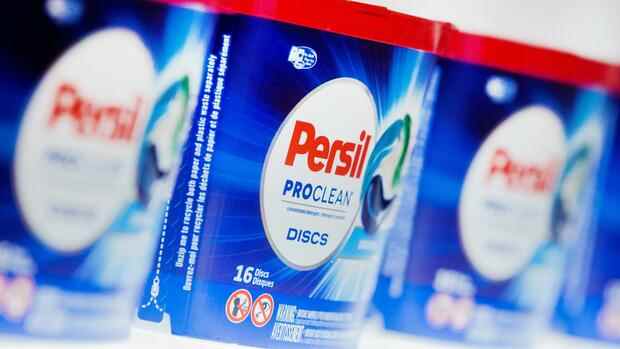Dusseldorf After two years of declining profits, the Dax group Henkel increased its earnings for the first time in 2021. In the past year, the manufacturer of Persil, Schauma and Pritt achieved a profit before taxes (EBIT) of 2.2 billion euros – an increase of 9.6 percent compared to the crisis year 2020. Henkel announced this on Wednesday.
However, the group is still below the pre-pandemic level. In 2019, Henkel still achieved an EBIT of 2.9 billion euros. “Overall, business development was good – despite a very difficult business environment with sometimes massive disruptions to global supply chains, shortages of important raw materials and extremely sharply rising prices,” said CEO Carsten Knobel on Wednesday, according to a company statement.
Henkel is under pressure on the stock exchange. Since Knobel took office in January 2020, the Düsseldorf-based company’s share prices have fallen by 20 percent, while the shares of competitors such as Procter & Gamble and L’Oréal have gained 30 percent in value during this time.
The group’s problem child is the cosmetics division with brands such as Fa, Schauma and Schwarzkopf. In 2021, this segment achieved a slightly lower turnover of almost 3.7 billion euros. However, the EBIT was only 77 million euros – a significant drop of 69 percent compared to the previous year.
Top jobs of the day
Find the best jobs now and
be notified by email.
This decline can also be explained by the fact that Henkel sold or discontinued low-growth brands and businesses with a sales volume of around 500 million euros by the end of 2021.
For 2022, manufacturer Henkel expects organic sales growth for the group in the range of two to four percent.
(Photo: dpa)
Nevertheless, Henkel’s cosmetics business is becoming less and less profitable. The EBIT margin in this segment was only 2.1 percent in 2021 after 6.6 percent in the previous year. Competitors such as Unilever or L’Oréal clearly achieve double-digit values. An explanation: Henkel primarily offers mass-produced goods, but significantly higher margins can be achieved with luxury products or high-quality skin creams.
Industrial adhesive as growth driver
Henkel’s other two divisions were significantly more profitable. Henkel achieved an EBIT of 797 million euros with detergents and cleaning agents such as Persil and Pril, despite a slight decline in sales – an increase of almost 16 percent compared to the previous year.
The group’s growth driver is the adhesives business. In this division, Henkel achieved a pre-tax profit of 1.5 billion euros – an increase of 22 percent. The sale of industrial adhesives is significantly more profitable than the business with shampoos or creams: The EBIT margin in the adhesives area was 15.8 percent.
>> Read here: Henkel loses touch with the competition
Henkel is a global leader in industrial adhesives. The prospects in this area are good. Henkel should benefit from the fact that adhesives will be used more frequently in the future and will replace other fastening methods, especially in the growth area of electromobility. In addition, experts expect the industry to recover for several years. The adhesives business is becoming increasingly important to Henkel’s success: It accounts for 48 percent of sales, but accounted for 69 percent of adjusted profit in 2021.
Group restructuring to strengthen business
Henkel boss Knobel wants to react to the weakening cosmetics business with a corporate restructuring. This division is to be merged with the detergents and cleaning agents division and will operate under the name “Consumer Brands” from 2023. In the future, Henkel will stand on two pillars of about the same size.
Knobel sees synergies in the areas of administration, sales and marketing. He hopes to be able to make faster decisions in a joint unit. Knobel announced this at the end of January, but failed to provide numerous details. Further insights are expected on Wednesday during the balance sheet press conference. So far, it is also unclear how many employees Henkel intends to lay off as part of the restructuring of the company.
Company observers view the conversion plans with skepticism. The merger is a defensive measure with advantages on the cost side, says analyst David Varga. For the expert from Bankhaus Metzler, such a conversion does not lead directly to increased sales. “Henkel is not in attack mode, the plan does not look like the big liberation.”
The Group will not pay shareholders a higher dividend for the past financial year. Henkel announced on Wednesday that investors will receive EUR 1.85 per preferred share and EUR 1.83 per common share.
More: Undervalued and low-risk: Why investing in Henkel shares could now be worthwhile

